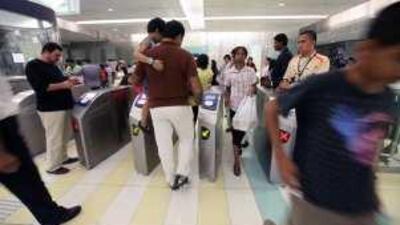DUBAI // Transport officials are planning a second large-scale education drive for Metro users this week after serious passenger-related disruptions over the weekend. On Friday, two days after the official launch, 30,000 people showed up within the first two hours of the 2pm opening, causing chaos at the stations. Many others, unaware of the afternoon opening, were turned away in the morning.
People with questions about pricing and tickets formed long queues at ticket counters. As a result, the Roads and Transport Authority (RTA) will start a new advertising campaign over the next few days in a bid to move people through the stations more quickly. The advertisements will run on radio and television and in newspapers over the course of the week, the RTA said. "We have over 180 nationalities and so many different languages," said Peyman Younes Parham, director of marketing and corporate communications for the authority.
"We are going to embark on a heavy educational campaign, like explaining fare structure again, buying tickets and what type of tickets are available, the fines, courtesy and ethics on the trains." Passengers, not knowing what type of tickets were available or how much they cost, inundated staff behind the ticket counters with questions, resulting in long queues. "I knew where it would take me, but I didn't know for exactly how much and what type of card I needed," said Pratik Vidihar, an Indian, at the Nakheel Harbour and Tower station. "I think the ticketing system was too complicated."
The RTA, attributing the train delays on Friday to passengers who pressed the emergency stop buttons, said it would remind the public of the fines for hitting the buttons without a valid reason. The RTA started sending text messages to residents on Friday night asking them to be "calm and courteous" when travelling on the system and asking if they had any questions. "Passengers should not abuse the system," the message read, "which would result in legal action against them."
Hundreds of people queued up on Friday evening to take the Metro from the Mall of the Emirates station, where there were scenes of pushing and shoving as passengers grew impatient. Security officers tried to control the situation by allowing only 200 people in at a time. The RTA conceded that its message inside the stations was so far falling on deaf ears. "We are informing the public through TV screens and the PA systems," Mr Parham said. "That is the key, and we want people to listen to that. That is where we are telling people about what's happening and what needs to happen and what the action is and how the service is.
"A lot of people are just not paying attention right now to the staff on the trains. Nobody is asking them what to do or what is happening or what they need to do. We don't want people to panic. We want them to relax." The RTA ran a promotional campaign based on market research a month before the Metro launched. The firm Saatchi and Saatchi created the advertisements for the RTA and was also responsible for the slogan "My City. My Metro." - which is plastered across the emirate on bridges and billboards and appears in every Metro advertisement.
eharnan@thenational.ae

